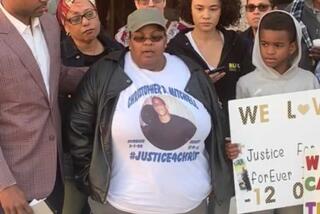DNA Tests Finally Clear Louisiana Man of Murder
Louisiana prosecutors agreed to dismiss all charges Monday against a man who spent more than five years on death row after five DNA tests showed that he had no connection to the 1997 slaying of a grocery store owner.
“The results of these scientific tests failed to establish any forensic link between” defendant Ryan Matthews and clothing worn by the killer that was recovered near the crime scene, said Jefferson Parish Dist. Atty. Paul D. Connick Jr. in Gretna.
Matthews, 24, became the nation’s 115th death row inmate to be exonerated in the last 25 years, according to the Death Penalty Information Center in Washington. “The growing number of innocence cases provides overwhelming evidence that the death penalty is far too risky,” said Richard C. Dieter, the organization’s executive director.
Matthews is the seventh death row inmate cleared in Louisiana since 1981 and one of three who had been sentenced to death for crimes allegedly committed while they were juveniles.
The U.S. Supreme Court is scheduled to hear a Missouri case next term to decide whether it is constitutional to execute 16- or 17-year-olds.
Matthews’ case drew interest because prosecutors had refused to acknowledge the significance of several DNA tests, none of which implicated Matthews. Such tests are often the strongest evidence prosecutors can use to obtain guilty verdicts. They also have been used to free people who were wrongly convicted.
No physical evidence linked Matthews, who had just turned 17 when he was arrested, to the slaying of Tommy Vanhoose, the well-liked owner of Comeaux’s Grocery in Bridge City, near Gretna, which lies across the Mississippi River from New Orleans. Vanhoose was shot four times with a .38-caliber revolver during a robbery attempt and bled to death May 29, 1997.
Matthews proclaimed his innocence. His codefendant, Travis Hayes, initially told investigators that he knew nothing about the killing. But after six hours of interrogation, Hayes then said he had driven with Matthews to Vanhoose’s store, watched his friend go in and, about 15 minutes later, heard shots and saw Matthews run out.
Hayes later recanted the confession. Still, he was convicted of second-degree murder for his involvement in the killing. Matthews was convicted primarily on the basis of eyewitness testimony that his lawyers have maintained was erroneous.
At Matthews’ trial in 1999, an expert testified that DNA found on a ski mask worn by the killer did not match Matthews’. Prosecutors said those test results did not conclusively establish that Matthews was innocent.
After Matthews went to prison, further DNA tests excluded him. Connick said Monday that results “confirmed the presence of Rondell Love’s DNA on the mask.” Love is serving a 20-year sentence in Angola, La., for killing a woman in the same neighborhood where Vanhoose died. Three Angola inmates filed declarations in court last year saying that Love had bragged to them that he had killed Vanhoose.
For months after the third set of DNA tests, Connick’s office resisted granting Matthews a new trial. Then, in mid-April, on the eve of hearings to review allegations that prosecutors suppressed information about one of their key witnesses during Matthews’ 1999 trial, Connick said that Matthews was entitled to a new trial.
A month ago, Matthews was allowed to go home on $105,000 bond, though he had to wear an ankle bracelet so his whereabouts could be monitored.
Then, on Monday, one of Connick’s prosecutors told state district Judge Henry Sullivan that the district attorney’s office had agreed to dismiss all charges. Matthews, accompanied by his lawyers, had his monitor removed and went off to a celebratory lunch with the lawyers, his mother, Pauline, his sister Monique and friends.
Matthews was not available for comment, but family members expressed joy at the outcome. “I am very happy,” his mother said from Gretna. “Ryan is finally free.”
“We are just glad it’s over,” said his sister. “We can’t wait to start all over.”
Lawyer Billy Sothern of the Louisiana Crisis Assistance Center in New Orleans, one of Matthews’ appellate attorneys, said that although he was pleased by the outcome, the case should be viewed in a broader context. “Ryan’s case is another indication that there are serious systemic problems with the death penalty in Louisiana,” he said.
Lawyer Emily Bolton of the Louisiana Innocence Project, who represents Hayes, Matthews’ codefendant, said she would continue to push for her client’s release.
“I am completely confident that when the district attorney’s office takes the time to review Mr. Hayes’ case they will come to the same conclusion that they did regarding Mr. Matthews,” Bolton said. “The only remaining evidence against Mr. Hayes is a statement he made saying Mr. Matthews did it, which has now been proven false by DNA evidence as the district attorney’s statement today agreed.”
More to Read
Sign up for Essential California
The most important California stories and recommendations in your inbox every morning.
You may occasionally receive promotional content from the Los Angeles Times.










